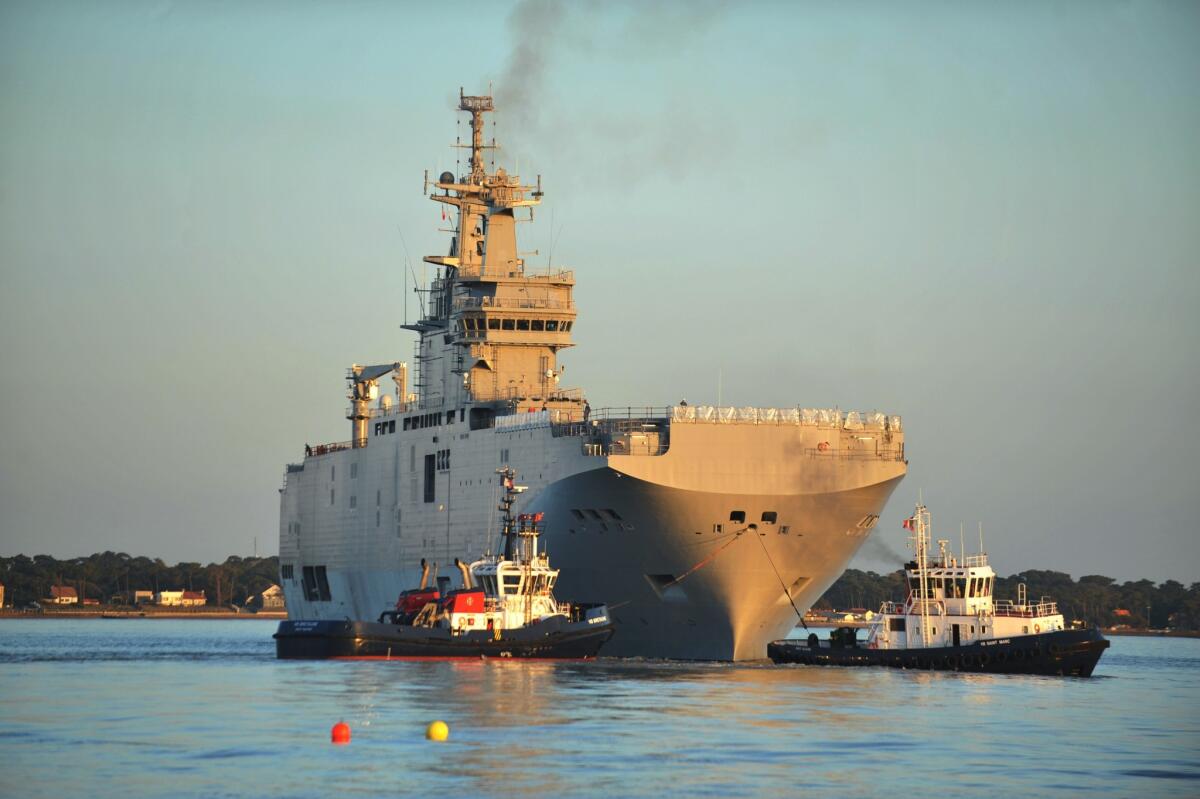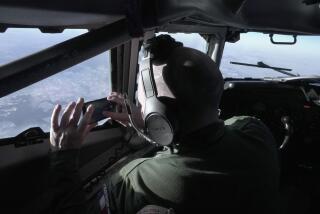France threatens to cancel military ship deal with Russia

- Share via
PARIS — Hinting at tougher sanctions to come against Moscow for its moves toward annexing Crimea, France said Tuesday it could cancel a $1.3-billion deal to sell Russia two state-of-the-art warships.
At the same time, the British government announced it was suspending military cooperation with Moscow. And Vice President Joe Biden, on a hastily planned visit to Eastern Europe, warned of additional penalties on top of the asset freezes and travel bans slapped on more than two dozen Russian and Crimean officials by the United States and European Union on Monday.
In Paris, French Foreign Minister Laurent Fabius said Moscow’s incursion into the Crimean peninsula could jeopardize a controversial deal — opposed by the U.S. when it was signed three years ago — to supply Russia with two advanced Mistral ships. The Mistral is a multi-use vessel whose rapid sea and land assault capabilities have led to the French navy nicknaming it the “Swiss Army knife” of the sea
Fabius acknowledged that shelving the contract would have negative economic consequences for France and said his country should not be expected to suffer alone. Paris wants a coordinated effort by the 28 EU nations, whose leaders will meet Thursday to consider further sanctions against Moscow.
“If Putin continues doing what he’s doing, we could envisage canceling the sales,” Fabius told television station TF1 on Tuesday. “But we will ask others, and I’m thinking namely the British, to do the same with the assets of the Russian oligarchs in London. Sanctions have to be shouldered by everyone.”
Such sanctions would bump up the EU to what it describes as the third level in a three-tiered process of punishing Russia for its aggression in the strategically important Crimea peninsula, which the West insists still belongs to Ukraine.
Fabius’ remarks appear to mark a change of direction by the government of French President Francois Hollande, who said only last week that his nation would honor its “signed contract” regarding the warships.
Russian Deputy Prime Minister Dmitry Rogozin responded to Fabius’ remarks by warning on Twitter that “France is starting to undermine confidence in it as a reliable provider in the very sensitive sector of military and technical cooperation.”
British Foreign Secretary William Hague said his country was putting military cooperation with Russia on ice, including arms exports.
In a speech in the British Parliament, Hague slammed Putin’s decision to annex Crimea after Sunday’s vote there on seceding from Ukraine, a referendum that the West regards as an illegitimate exercise conducted at gunpoint. Hague dismissed Putin’s declaration that Moscow was simply reclaiming “an integral part of Russia” that had been wrongly deeded to Ukraine in 1954 after centuries under Russian rule.
“No amount of sham and perverse democratic process or skewed historical references can make up for the fact that this is an incursion into a sovereign state and a land grab of part of its territory with no respect for the law of that country or for international law,” Hague told lawmakers.
The annexation of Crimea has jangled the nerves of former Soviet satellite countries, such as Poland and the Baltic nations, that joined NATO after the breakup of the Soviet Union. In a last-minute trip to Warsaw on Tuesday, Biden warned that “Russia’s political and economic isolation will only increase if it continues down its current path, and [Moscow] will in fact see additional sanctions by the United States and the EU.”
The warship deal between France and Russia infuriated Washington when it was signed by then-French President Nicolas Sarkozy, Hollande’s predecessor, in 2011, just three years after Moscow’s military intervention in the nation of Georgia. The deal gave Moscow an option on two additional Mistrals to be jointly built by France and Russia.
The Mistral is a 600-foot-long, rapid-response air and sea attack vessel weighing more than 20,000 tons and capable of carrying 16 helicopters, landing craft, 60 armored vehicles, 13 battle tanks and about 450 troops.
The first of the two warships promised to Russia, the Vladivostok, began trials last week off the French coast at Saint Nazaire, where it is being built. It is supposed to be delivered by the end of the year.
The second ship, named the Sevastopol after the now-contested Crimean Black Sea port, is under construction and due to be handed over in 2016.
Twitter: @HenryHChu
Special correspondent Willsher reported from Paris and Times staff writer Chu from London.
More to Read
Sign up for Essential California
The most important California stories and recommendations in your inbox every morning.
You may occasionally receive promotional content from the Los Angeles Times.











